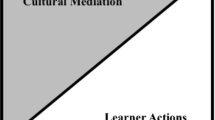Abstract
When solving a scientific problem through experimentation, students may have the responsibility to design the experiment. When students work in a conventional condition, with paper and pencil, the designed procedures stay at a very general level. There is a need for additional scaffolds to help the students perform this complex task. We propose a computer environment (copex-chimie) with embedded scaffolds in order to help students to design an experimental procedure. A pre-structuring of the procedure where the students have to choose the actions of their procedure among pre-defined actions and specify the parameters forces the students to face the complexity of the design. However, this is not sufficient for them to succeed; they look for some feedback to improve their procedure and finally abandon their task. In another condition, the students were provided with individualized feedbacks on the errors detected in their procedures by an artificial tutor. These feedbacks proved to be necessary to accompany the students throughout their experimental design without being discouraged. With this kind of scaffold, students worked longer and succeeded better to the task than all the other students.



Similar content being viewed by others
References
Apedoe X, Ford M (2010) The empirical attitude, material practice and design activities. Sci Educ 19:165–186
Arce J, Betancourt R (1997) Student-designed experiments in scientific lab instruction. J Coll Sci Teach 27(2):114–118
Chevallard Y (1999) L’analyse des pratiques enseignantes en théorie anthropologique du didactique. Recherches en Didactique des Mathématiques 19(2):221–266
De Jong T, van Joolingen WR (1998) Scientific discovery learning with computer simulations of conceptual domains. Rev Educl Res 68(2):179–201
Etkina E, Karelina A, Ruibal-Villasenor M (2010) Design and reflection help students develop scientific abilities: learning in introductory physics laboratories. J Learn Sci 19:54–98
Girault I, Cross D, d’Ham C (2007) Students’ adaptation to a new situation: the design of an experimental procedure. In Proceedings of ESERA conference. Malmö, Sweden, 21–25 August
Girault I, d’Ham C, Ney M, Sanchez E, Wajeman C (2012) Characterizing the experimental procedure in science laboratories: a preliminary step towards students experimental design. Int J Sci Educ 34(6):825–854. doi:10.1080/09500693.2011.569901
Graesser AC, McNamara DS, VanLehn K (2005) Scaffolding deep comprehension strategies through point and query, autotutor, and iSTART. Educ Psychol 40(4):225–234
Hmelo-Silver CE, Duncan RG, Chinn CA (2007) Scaffolding and achievement in problem-based and inquiry learning: a response to Kirschner, Sweller, and Clark (2006). Educ Psychol 42(2):99–107. doi:10.1080/00461520701263368
Jordan RC, Ruibal-Villasenor M, Hmelo-Silver CE, Etkina E (2011) Laboratory materials: affordances or constraints? J Res Sci Teach 48(9):1010–1025. doi:10.1002/tea.20418
Karelina A, Etkina E. (2007). Acting like a physicist: student approach study to experimental design. Phys Rev ST Phys Educ Res 3:12 (online Journal: http://prst-per.aps.org/)
Koretsky MD, Amatore D, Barnes C, Kimura S (2008) Enhancement of student learning in experimental design using a virtual laboratory. IEEE Trans Educ 51(1):76–85
Laugier A, Dumon A (2003) Résolution de problème et pratique expérimentale : analyse du comportement des élèves en début de seconde. Chem Educ Res Pract 4(3):335–352
Leont’ev AN (1978) Activity, consciousness, and personality. Prentice-Hall Englewood Cliffs, Nj
Lipscomb, Swanson, West (2012, January 26). Scaffolding—emerging perspectives on learning, teaching and technology. Retrieved from http://projects.coe.uga.edu/epltt/index.php?title=Scaffolding
Marzin P, De Vries E (2008) How can we take into account student conceptions of the facial angle in a palaeontology laboratory work? In International Conference on Learning Science (p. 567). Utrecht, Netherlands, June, 23–28
Morgan K, Brooks D (2012) Investigating a method of scaffolding student-designed experiments. J Sci Educ Technol 21(4):513–522. doi:10.1007/s10956-011-9343-y
Neber H, Anton M (2008) Promoting pre-experimental activities in high-school chemistry: focusing on the role of students’ epistemic questions. Int J Sci Educ 30(13):1801–1821
Ohlsson S (1996) Learning from error and the design of task environments. I J Educ Res 2(5):419–448. doi:10.1016/S0883-0355(97)81236-0
Ohlsson S (2002) Constraint-based student modelling. I J Artif Intell Educ 3:429–447
Pea RD (2004) The social and technological dimensions of scaffolding and related theoretical concepts for learning, education, and human activity. J Learn Sci 13(3):423–451
Quintana C, Reiser BJ, Davis EA, Krajcik J, Fretz E, Duncan RG, Soloway E (2004) A scaffolding design framework for software to support science inquiry. J Learn Sci 13(3):337–386
Reiser BJ (2004) Scaffolding complex learning: the mechanisms of structuring and problematizing student work. J Learn Sci 13(3):273–304. doi:10.1207/s15327809jls1303_2
Rodriguez E, Bosch M, Gascon J (2007) An anthropolical approach to metacognition: the “study and research courses”. In Philippou DP-PG (Ed.), Fifth Congress of the European Society for Research in Mathematics Education. Larnaca, Cyprus, http://ermeweb.free.fr/CERME5b/
Séré MG (2002) Towards renewed research questions from the outcomes of the European project labwork in science education. Sci Educ 86(5):625–643
Séré MG, Beney M (1997) Le fonctionnement intellectuel d’étudiants réalisant des expériences: observation de séances de travaux pratiques en premier cycle universitaire scientifique. Didaskalia 11:75–102
Wood D, Bruner JS, Ross G (1976) The role of tutoring in problem solving. J Child Psychol Psychiatry 17:89–100
Acknowledgments
We thank Nadine Mandran who helped us to design and conduct the experiment. In addition, we thank the internal reviewers who greatly improved this article.
Author information
Authors and Affiliations
Corresponding author
Rights and permissions
About this article
Cite this article
Girault, I., d’Ham, C. Scaffolding a Complex Task of Experimental Design in Chemistry with a Computer Environment. J Sci Educ Technol 23, 514–526 (2014). https://doi.org/10.1007/s10956-013-9481-5
Published:
Issue Date:
DOI: https://doi.org/10.1007/s10956-013-9481-5




